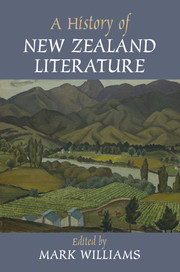Book contents
- Frontmatter
- Contents
- Notes on Contributors
- Acknowledgments
- Introduction
- PART I 1760–1920
- PART II 1920–1950
- PART III 1950–1972
- 11 Against the Social Pattern: New Zealand Fiction, 1950–1970
- 12 Janet Frame: Myths of Authorship, 1950–1990
- 13 Te Ao Hou: Te Pataka
- 14 Out of the Drawing Room and onto the Beach: Drama, 1950–1970
- 15 ‘Physician of Society’: The Poet in the 1950s and 1960s
- PART IV 1972–1990
- PART V 1990–2014
- Index
13 - Te Ao Hou: Te Pataka
from PART III - 1950–1972
Published online by Cambridge University Press: 05 April 2016
- Frontmatter
- Contents
- Notes on Contributors
- Acknowledgments
- Introduction
- PART I 1760–1920
- PART II 1920–1950
- PART III 1950–1972
- 11 Against the Social Pattern: New Zealand Fiction, 1950–1970
- 12 Janet Frame: Myths of Authorship, 1950–1990
- 13 Te Ao Hou: Te Pataka
- 14 Out of the Drawing Room and onto the Beach: Drama, 1950–1970
- 15 ‘Physician of Society’: The Poet in the 1950s and 1960s
- PART IV 1972–1990
- PART V 1990–2014
- Index
Summary
Before Ihimaera published his first novel in 1973, there was no Maori literary tradition.
Mana Magazine (November/December 2014)Members of the New Zealand Women Writers’ Federation meeting on two successive nights at Wakefield House in Wellington seemed at first interested, then surprised, astonished and delighted at the revelation of the quality of Maori literature, both in its ancient and traditional oral forms, and in the more modern work of today's poets and story-tellers.
Te Ao Hou 71 (1973)A recent profile of iconic Māori writer Witi Ihimaera, a national Māori magazine with an estimated readership of one hundred thousand, enthused that prior to Ihimaera's first novel ‘there was no Māori literary tradition’. Certainly, Tangi was the first novel in English published by a Māori writer, but in 1972 Ihimaera had published his now classic collection of short fiction, Pounamu Pounamu, and Hone Tuwhare his third collection of poetry. Indeed, Māori people had been writing and publishing since the early nineteenth century and the Māori literary tradition, when not limited to written literature, is centuries old; when not limited to Aotearoa, it stretches back across the Pacific for millennia. Te Ao Hou, a magazine published by the Maori Purposes Fund Board of the Department of Maori Affairs between 1952 and 1975, is full of Māori writing. This chapter traces key aspects of Te Ao Hou by exploring four metaphors by which it has been – or might be – understood. Firstly, the magazine proclaims its own historical and cultural context through its name Te Ao Hou, usually translated as ‘The New World’; this metaphor heralded the entry of Māori people into a particular kind of modernity. Secondly, Te Ao Hou was introduced by its first editor as a ‘marae on paper’, a cultural and social space for diverse Māori discussion, self-expression, and participation. Another metaphor draws on the proverb ‘ka pū te ruha, ka hao te rangatahi’ (when the old net is worn out, the new net goes fishing); this emphasises that while things are necessarily remade, a new product need not signal departure from an established practice. Finally, I will propose the metaphor of the pataka (storehouse) as a way to think about reading Te Ao Hou's mid-twentieth-century Māori writing in the first decades of the twenty-first century.
- Type
- Chapter
- Information
- A History of New Zealand Literature , pp. 182 - 194Publisher: Cambridge University PressPrint publication year: 2016
- 1
- Cited by



